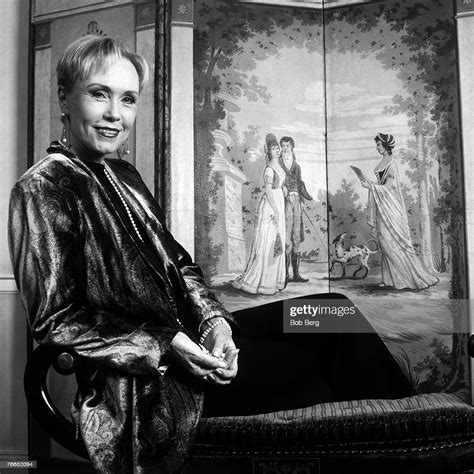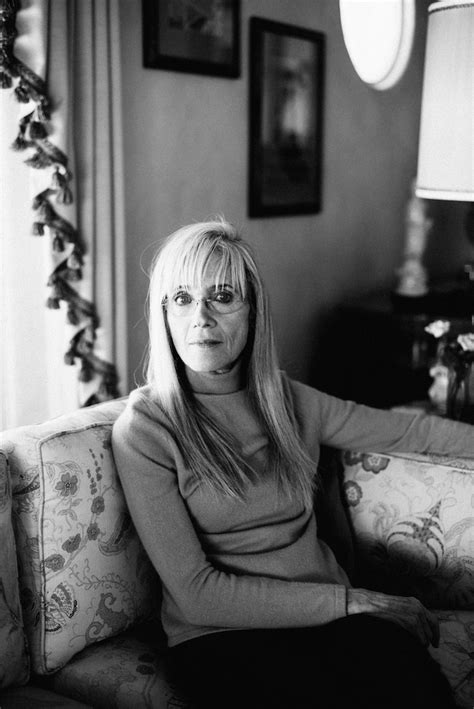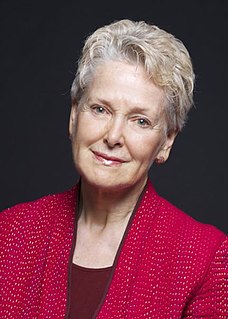A Quote by Joyce Banda
Women didn't go to school when they were young because parents preferred to send their brothers. The women couldn't access loans in their own right because the banks sought the approval of a male dependent.
Related Quotes
Men ruled the roost and women played a subservient role [in the 1960s]. Working wives were a rarity, because their place was in the home, bringing up the kids. The women who did work were treated as second-class citizens because it was a male-dominated society. That was a fact of life then. But it wouldn't be tolerated today, and that's quite right in my book... people look back on those days through a thick veil of nostalgia, but life was hard if you were anything other than a rich, powerful, white male.
Do women dress for men or women? I’ve always wondered why that eternally provocative question is put in terms of approval - as if the heart of the matter, the answer, were indeed a question of approval by either sex. But the question is never satisfactorily answered because it is incorrectly posed. It’s disapproval, the fear of it, that motivates most women, and with disapproval it doesn’t matter where it comes from.
It just struck me as really odd that there were all of these conversations going on about what young women were up to. Were young women having too much sex? Were young women politically apathetic? Are young women socially engaged or not? And whenever these conversations were happening, they were mostly happening by older women and by older feminists. And maybe there would be a younger woman quoted every once in a while, but we weren't really a central part of that conversation. We weren't really being allowed to speak on our own behalf.
In the developing world, they don't have smartphones yet. They have the older plastic phones, but women are saving money on those, because they don't have access to banks. Having that access to digital money changes everything for her because she actually doesn't have to negotiate with her husband, which she will tell you is very hard in these circumstances, especially when the means are meager. She's expected to have money to pay for the kids' health or to help with the school fees.
Young women know that something is off; they know that the world is a messed-up place. They know that the world is a sexist place because they've had experiences in their own life; they see things happening to their friends, to their parents. But because feminism isn't widely accepted, because they don't necessarily have access to feminist thought or to feminist groups, they don't necessarily have a language to put behind the feelings and the thoughts that they're having. And they certainly don't have a support system to let them know like, hey, that's okay; you're right, that is screwed up.
The feminist movement is not about success for women. It is about treating women as victims and about telling women that you can't succeed because society is unfair to you, and I think that's a very unfortunate idea to put in the minds of young women because I believe women can do whatever they want.
I've found that when I was young, all the pretty girls at school got all the dates and went to all the big parties and everything because they were pretty. They never bothered to develop anything. And as they aged, their prettiness faded and they were left as middle-aged women who were very, very unhappy and disappointed. But I can't feel sorry for them because that was their own doing.
Women, I learned, adapted.
At first..they seemed so fragile, so dependent on fathers and husbands and brothers and lovers. Gradually, though, I noticed how supple their lives were beneath the surface. Then I realized it was this flexibility that enabled them to survive...that sooner or later, by choice or by chance, most women faced the task of adapting to a future on their own. When at my most optimistic, I thought of it as independence; in darker moods, as survival. Either way women had to do it.
I specially want to have young women not to wait as I did until my children were grown, but young women to come in to gain their seniority so they could be respected leaders at a much earlier age. It's important for all women to see young women who share their experience whether it's as a working mom with young children, who understands the struggle and the aspirations of young women in a similar situation. And if they don't have family and they're pursuing their career women should see that as well.
Comedy in the past hasn't spoken to women because it wasn't written by women, and male writers don't make women three-dimensional characters. Too often, women just facilitate the man's comedy: they're not crazy; they're not funny. But women are as vulgar as they are elegant, as stinky as they are smelling of eau de parfum.
If you look at most women's writing, women writers will describe women differently from the way male writers describe women. The details that go into a woman writer's description of a female character are, perhaps, a little more judgmental. They're looking for certain things, because they know what women do to look a certain way.

































